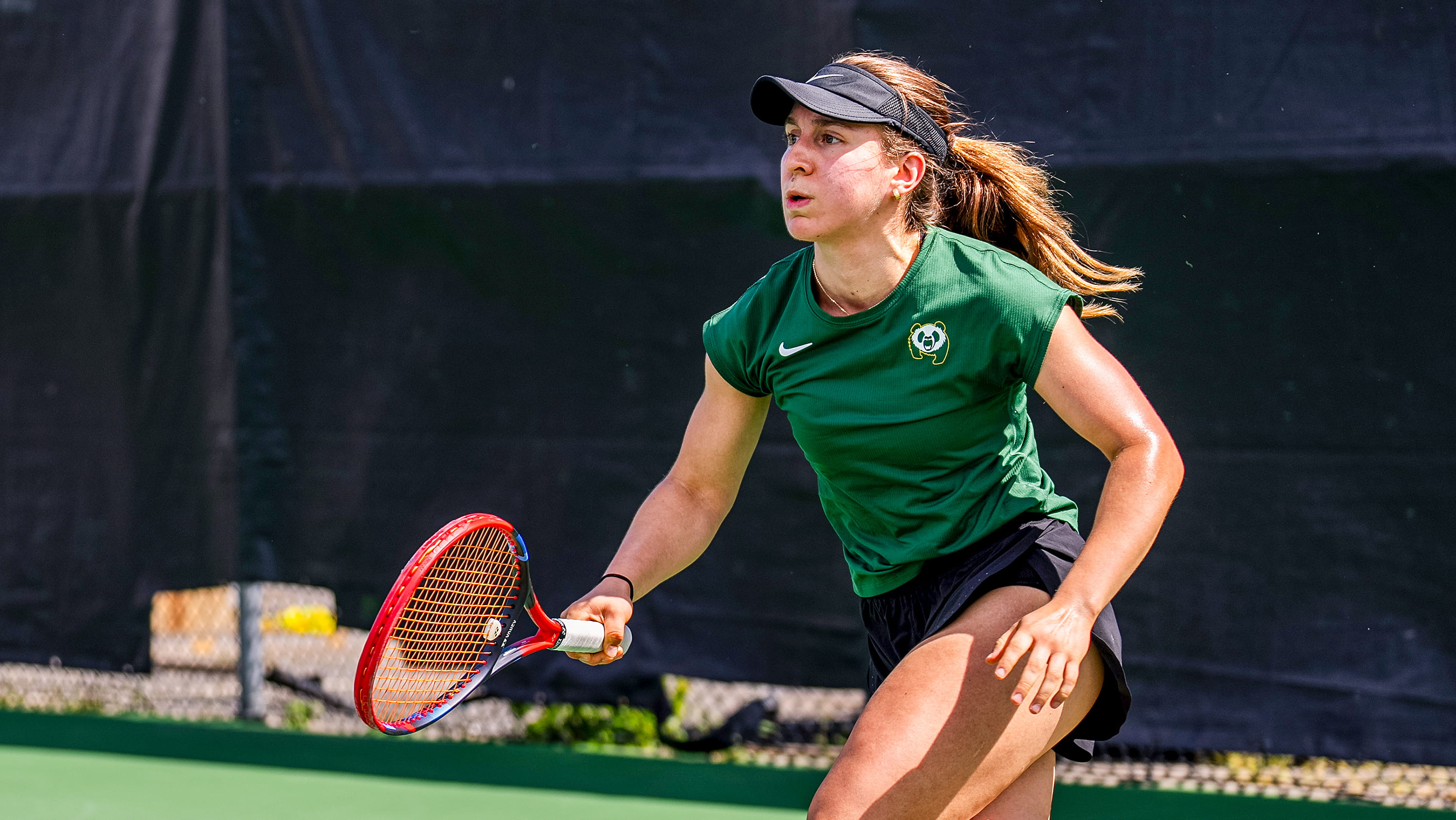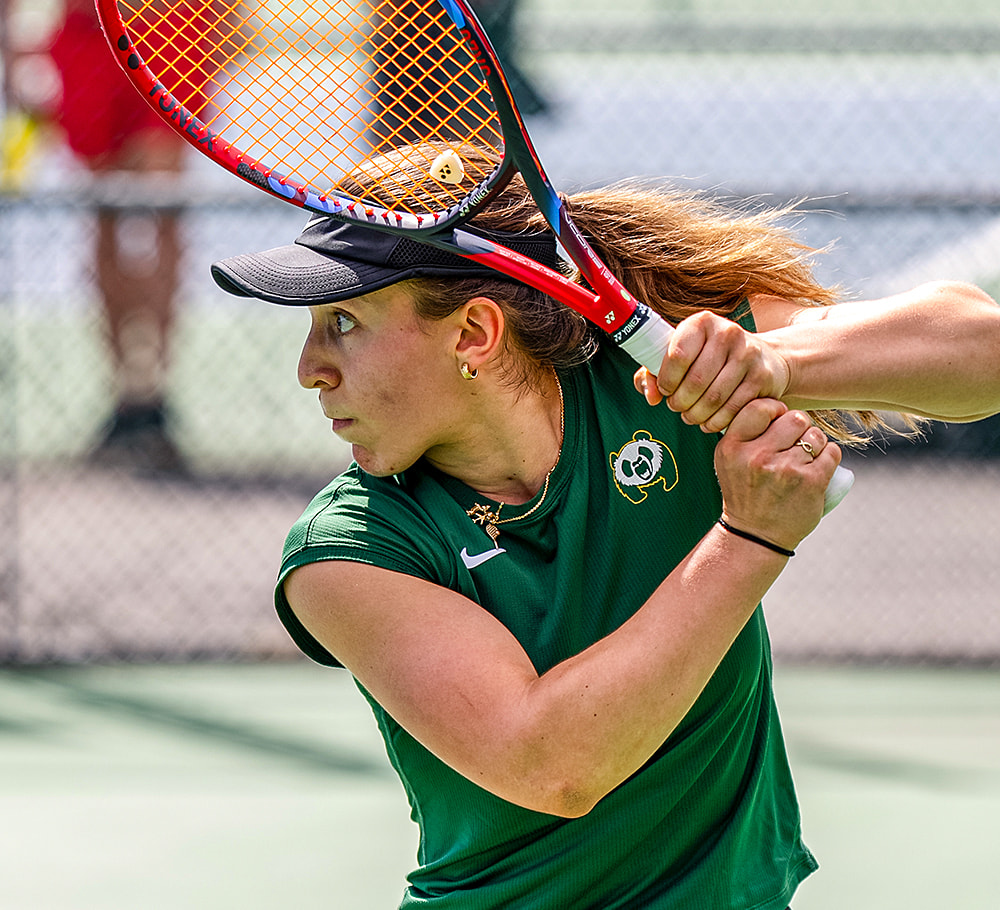The University of Alberta’s tennis Pandas were fighting to stay alive in their fourth consecutive national championship, and things were looking grim.
“We were down in the overall score, and the team was a bit shaken,” says team captain Emma Rutherford, recalling a crucial singles final in the summer of 2023 against Western University. She was facing an opponent she’d only ever played once and lost.
Rutherford fought with calm and steely determination, winning the match 6-4, 6-4 and putting the team within striking distance of taking the prize. A surge of confidence lifted the team.
In the final match of the tournament, Alexandra Jewitt managed to eke out a win in a nail-biting third-set tiebreaker. The Pandas had clinched their fourth straight national championship — their third with Rutherford on the team — a feat that hadn’t been accomplished by any Pandas team in 20 years.
A team player and a “coach’s dream”
Rutherford is keenly aware of the role she plays on the team. Sometimes it’s not so much about showboating with flashy winners, but rather excelling on defence and showcasing the mental game — even if that means demonstrating how to lose.
“I feel like the way I carry myself has a huge impact on the team. If I’m super stressed or nervous, I have to put those feelings aside,” she says. “I really try to focus on being that rock for the rest of the team during competitions.
“I tell myself, ‘If I lose this match, it’s not the end of the world, but I need to make it as long as possible and fight as hard as I can, because the rest of the team will feed off of that.’”
Last summer they did it again, this time against Université Laval Rouge et Or, joining Pandas rugby and volleyball as the only teams in U of A history to win five straight national championships. It was Rutherford’s fourth, and the team’s first nationals as a member of U SPORTS, the national sport governing body for Canadian universities.
“Working with Emma is a coach’s dream,” says Pandas coach Ivan Quintero. “Her approach to competition is both strategic and disciplined, qualities that inspire her teammates and elevate our team’s play, especially during high-pressure matches.
“Her leadership goes beyond the court. She brings an undeniable energy and focus that elevates everyone’s game, setting the standard we all strive to reach.”
When she isn’t training at the Saville Tennis Centre, Rutherford is working on her degree in biomedical engineering, the most competitive program in the Faculty of Engineering. Students in the program design systems, software and devices to improve health care, including artificial organs, prostheses, medical instruments, wearable devices and information systems.
A winning combination
The most challenging year of Rutherford’s degree was her first, she says. She was juggling the demands of academia with her tennis training during the height of the pandemic, which postponed the national championships for a year. That meant she played two in the same year, helping the team win both tournaments.

U of A students will shape the future. You can help.
With your support, the next generation of change makers can access the resources, experiences and student spaces they need to tackle today’s challenges and shape a brighter tomorrow.
Find Out More
During one co-op placement at Polytechnique Montréal last year, she got the chance to work in a lab developing self-healing polymers, which are used to create artificial substances with the built-in ability to repair damage to themselves without external diagnosis or human intervention.
“The prof was really interested in tennis, so I got to help work on a grip sensor for a tennis racket,” says Rutherford.
Tennis and engineering have turned out to be a winning combination, she says.
“First year was really tough, but tennis isn’t something I have to do — it’s something I get to do. It’s a privilege, and I look forward to it every day.”
Her competitive streak and her capacity for emotional restraint were both obvious early in life. She first picked up a racket at the age of four in Calgary’s First Serve Tennis program (now called Aforza). During a practice drill where kids ran from line to line, the coach noticed that Rutherford “had to beat the other kids to every single line,” she says.
But she also stood out for her mental control. “A lot of kids would get angry and frustrated, and cry and scream. I was never like that,” she says. “My coach would joke that I was already stoic at nine years old … I think that has probably been my greatest strength.”
Rutherford started playing competitively at 10, training three times a week. By the age of 12 the training became more intense, with tournaments every weekend.
When it came time to apply to university, she briefly considered an American school where, like many with her talent, she could play NCAA Division 1. It’s the highest level of college sports competition, and one potential path to a professional career.
But it’s also difficult to succeed at both sports and academics, and the latter was just as important to her. That’s why she eventually chose the U of A. She had long entertained medical school but in the end, she chose biomedical engineering for its more varied career potential.
It was at a time when she was starting to lose her hunger for tennis, a condition only exacerbated by COVID restrictions. Joining the Pandas is what “really made me love the sport again,” she says, adding that she’s loving it more with each year.
Rutherford has one more year with the team, and a shot at a sixth consecutive national championship next August, which would tie the record for any U of A varsity team. After graduating she isn’t sure where her path leads, but she knows from both her varsity success and the engineering faculty’s co-op opportunities that any career has to involve being part of a team.
“I’m a people person, and the work atmosphere is important to me,” she says. “So I might look for something in the private industry. You see tangible results, and I like the challenge, motivation and drive — the entrepreneurial innovation.”
Rutherford received an entrance scholarship from the Faculty of Engineering, as well as an annual Alberta Athletics Scholarship and the Owen Schlosser Memorial Award.


